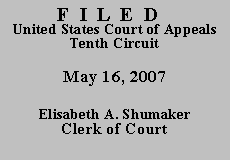

| MICHAEL MILLIGAN, |
|
| v. | |
| BILL REED, NATHAN ALGIEN, JOHN DOE, and ENDRE SAMU, in their individual capacities, |
After reviewing Milligan's response, the district court then determined that
Milligan failed to complete grievance procedures for three of his seven claims.
Based on our prior precedent requiring that a prisoner demonstrate exhaustion of
administrative remedies for every claim in a complaint, the district court
dismissed Milligan's second amended complaint. See Steele v. Fed. Bureau of
Prisons, 355 F.3d 1204, 120910 (10th Cir. 2003) (holding prisoners have the
burden of pleading exhaustion) and Ross v. County of Bernalillo, 365 F.3d 1181,
1189 (10th Cir. 2004) (holding prisoner must exhaust remedies on all claims
presented). The district court also denied Milligan's motion to reconsider and
motion for leave to proceed in forma pauperis, ruling that the appeal was not
taken in good faith. See 28 U.S.C. § 1915(a)(3).
We recently recognized that the Supreme Court's decision in Jones v. Bock,
127 S. Ct. 910 (2007), overruled both Steele and Ross. See
Freeman v. Watkins,
479 F.3d 1257 (10th Cir. 2007). Accordingly, Milligan need not show in his
complaint that he has administratively exhausted his claims. See Jones, 127 S.
Ct. at 921. Rather, defendants should now raise failure to exhaust as an
affirmative defense. See id. Furthermore, Milligan may proceed on his exhausted
claims even if he has not exhausted others. See id. at 92326.
In light of the foregoing discussion, we VACATE the district court's decision and REMAND for further proceedings in accordance with Jones v. Bock. We further grant Milligan's renewed motion for leave to proceed in forma pauperis. We remind Milligan of his obligation under this decision to continue making partial payments on the filing fee until the entire fee has been paid.
Entered for the Court
Timothy M. Tymkovich
Circuit Judge
*. This order and judgment is not binding precedent except under the doctrines of law of the case, res judicata and collateral estoppel. It may be cited, however, for its persuasive value consistent with Fed. R. App. P. 32.1 and 10th Cir. R. 32.1.
**. After examining the briefs and the appellate record, this three-judge panel has determined unanimously that oral argument would not be of material assistance in the determination of this appeal. See Fed. R. App. P. 34(a); 10th Cir. R. 34.1(G). The cause is therefore ordered submitted without oral argument.